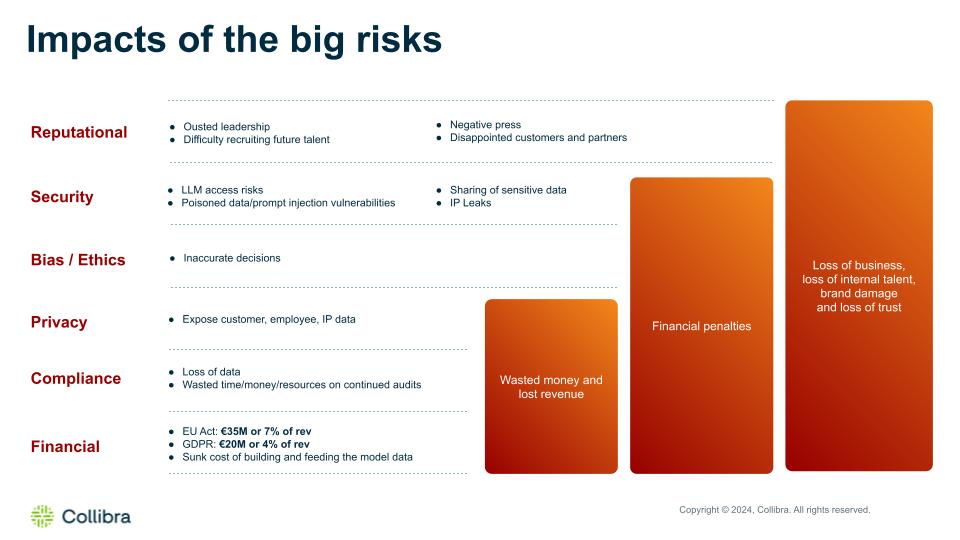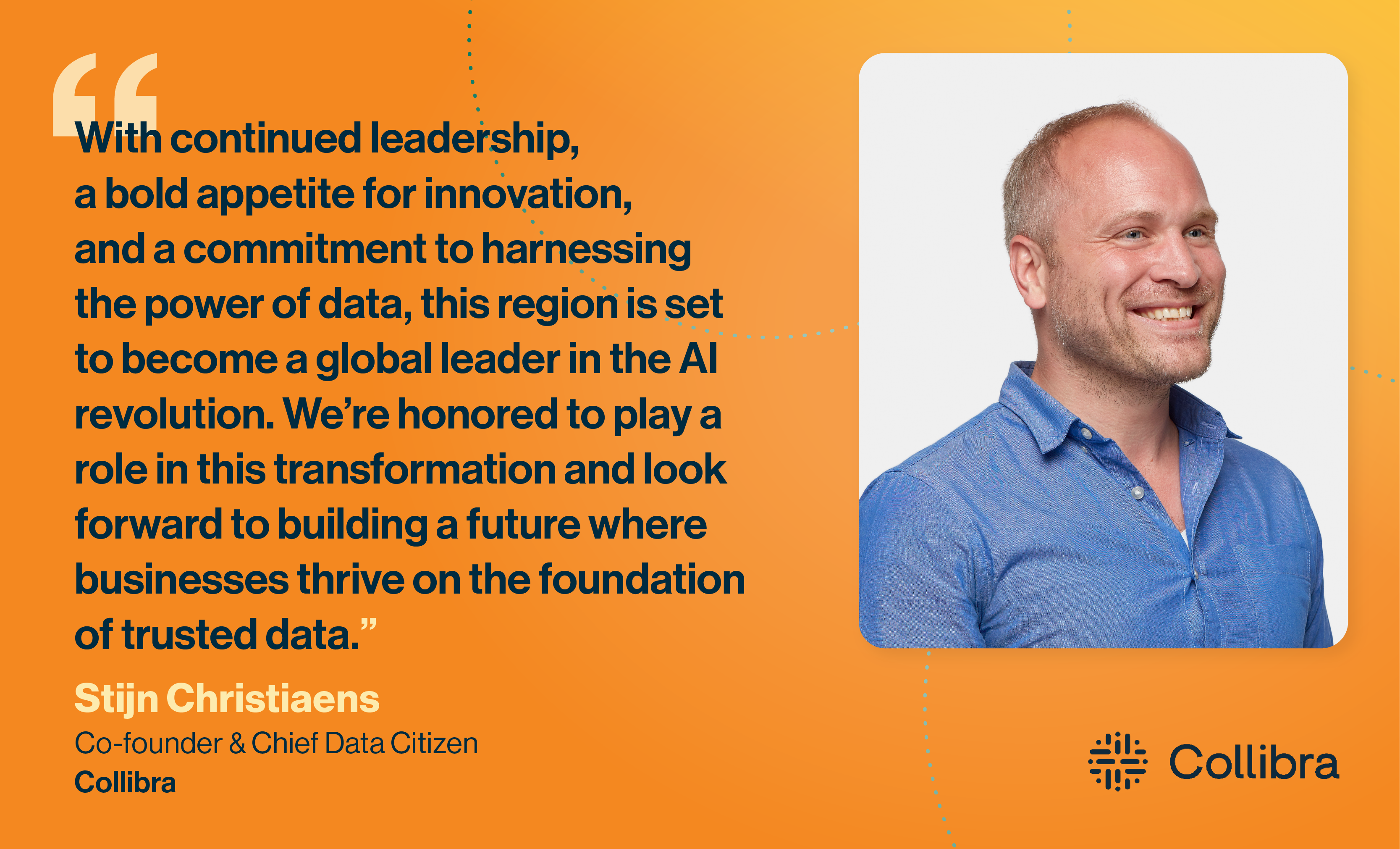Today at SAP Data Unleashed 2024, Collibra and SAP announced an expansion of our partnership to deliver end-to-end AI and data governance across the business data fabric.
As an SAP® Endorsed app available in the SAP Store, Collibra Data Intelligence offers a single system of engagement for data quality, data lineage and data governance — and will soon include Collibra AI Governance.
AI starts with trusted data
SAP Datasphere and Collibra offer enterprises a business data fabric architecture that can govern SAP and non-SAP data, delivering trusted data to all users no matter where it resides.
The meteoric rise in the innovation and investment into AI has further emphasized the critical importance of trusted data. As organizations increasingly use AI to automate customer experiences and business decisions, the need to understand and govern the data fueling AI applications has become even more critical.
SAP plays a significant role in providing the valuable data that powers AI, as its applications are essential in helping organizations run their most mission-critical business processes. Overall, SAP data provides a rich source of information that can be leveraged in AI applications to accelerate digital transformation, improve decision-making, enhance customer experiences, and gain competitive advantages in the market.
So how do you ensure the quality, integrity and ethical handling of the data used in your organization’s AI workstreams and applications? How do you prevent bias from appearing in your automated decisions?
The answer is that your organization needs AI governance.
How do you ensure the quality, integrity and ethical handling of the data used in your organization’s AI workstreams and applications?
Answer: AI governance.
AI governance and trusted data
At Collibra, we’re thrilled by the tidal wave of interest in AI.
The reality is that, as organizations attempt to ride the AI wave, there’s a critical element that’s often missing for those that rush forward in hyper-competitive markets to build scalable, trusted AI programs — and that’s AI governance.
Fortunately, we’ve seen this movie before. To a large degree, AI governance is an extension of our data governance efforts tested many times over with organizations around the world.
In the same way, our collaboration with SAP originated from the desire to provide complete end-to-end data governance for our customers. As such, we are thrilled to see SAP join us in our mission to empower all customers with AI governance.
The urgency of AI governance
While AI can solve complex problems and streamline decision-making, it raises essential considerations like data management, unintentional bias and transparency.
So what is AI governance?
AI governance is a set of policies, processes, and practices that an organization implements to ensure the responsible development, deployment, and use of artificial intelligence (AI) technologies. AI governance is an extension of data governance so an organization can understand how their data assets are enabling AI. Data governance provides the foundation for data policies, controls and practices across people, processes, and technology to enable trust in data. AI and data governance aims to ensure that AI is used ethically, transparently, and in a way that aligns with an organization’s values and objectives.
The high cost of bad AI governance
Let’s look at some compelling data illustrating why this has become a global pain point:
The cost of bias: More than one in three companies suffered losses due to AI bias in one or several algorithms, according to a recent survey of 350 CIOs, IT directors, IT managers, data scientists, and development leads who use or plan to use AI. (Source: Techworld)
Of the companies damaged by AI bias, more than half lost revenue (62 percent) or customers (61 percent), while nearly half lost employees (43 percent), and over a third incurred legal fees from litigation (35 percent), according to the research, which was conducted in collaboration with the World Economic Forum and global academic leaders.
AI is promising, but there are real risks and potentially significant costs if done without guardrails. That’s why AI governance is no longer optional for any business to be successful with AI.

The risks arising from a lack of AI governance include:
- Biased decision-making: If your data sets are biased, AI will perpetuate and amplify bias
- Inaccurate recommendations: Flawed or incomplete data undermines the reliability of predictive models, diminishing confidence, wasting resources and stifling innovation.
- Misinterpretation of data: Outliers and data anomalies can significantly impact AI models.
- Security/privacy risks: Poor data governance and quality can expose sensitive or highly confidential information, which can lead to security breaches, breach of contracts or the unauthorized use of information.
- Legal/ethical implications: Organizations may face legal or ethical consequences by making decisions based on inaccurate or biased AI inputs, highlighting the urgency for comprehensive AI governance in compliance with continually evolving regulations.
- Brand/reputation issues: Deploying AI systems that produce incorrect or biased results can erode public trust in your organization’s reputation.
AI governance requires more than just policies on paper. It demands businesses put processes, tools and training for people behind them – building an AI governance foundation within their data governance.
Despite the risks, there is a path forward on your journey to AI.
Trusted AI = Collibra AI Governance + SAP
Building trustworthy and beneficial AI is a challenge we must take on together.
The good news is that our partnership with SAP continues to expand. We started this relationship with a key principle – that a business data fabric architecture can only happen with good data governance. As AI continues to evolve at a rapid pace, a business data fabric must enable governance for data and AI to ensure organizations can confidently embrace and scale trustworthy AI.
We will work closely with SAP to bring visibility into the data fueling AI and the models themselves, allowing enterprises to track and manage their AI development efforts. Our primary focus will be in two key areas:
- Exposing metadata and lineage information of SAP data utilized in AI modeling. This will allow users to see what data their AI models were trained on and ensure that the data is accurate and from a trusted source.
- Integrating AI/ML models and vector embeddings created in SAP HANA Cloud with Collibra, so users can view all AI models, SAP and non-SAP, that exist within their organization in one place. This includes showing what data is being used to power intelligent data applications built on SAP HANA Cloud.
Organizations prioritizing AI governance – and leveraging an AI governance framework – are well positioned to realize improved compliance, responsible decision-making, reduced risk and customer trust – cornerstones for success in the new age of AI.
Is your team ready for AI governance? Learn more about Collibra AI Governance for SAP.
Missed SAP Data Unleashed 2024? Find out more about the event here and learn more about the announcements here.
As an SAP® Endorsed app available in the SAP Store, Collibra Data Intelligence offers a single system of engagement for data quality, data lineage and data governance — and will now include Collibra AI Governance.




